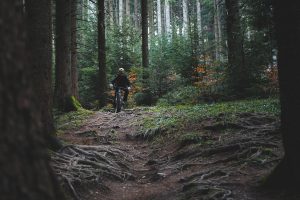 The McDonald-Dunn Forest offers serene refuge, the discussions about how to manage the forest, not always so much. Conflicts concerning how these lands are timber harvested have been headline fodder for years, most notably surrounding efforts to protect stands of old growth trees, which have sometimes been logged. But there has also been a quieter conflict brewing among recreational users of the forest as well.
The McDonald-Dunn Forest offers serene refuge, the discussions about how to manage the forest, not always so much. Conflicts concerning how these lands are timber harvested have been headline fodder for years, most notably surrounding efforts to protect stands of old growth trees, which have sometimes been logged. But there has also been a quieter conflict brewing among recreational users of the forest as well.
E-bikes are currently prohibited in the McDonald Dunn. Some want that to change – and others really-really don’t. So, what are the forest managers at Oregon State University’s College of Forestry to do.
They oversee about 35 miles of trails and 110 miles of forest roads on 11,250 acres. There are 155,000 visits annually to the forest.
As the university has been weighing its options, it conducted a new survey of visitor preferences and viewpoints, publishing it in December of 2024.
Its introduction points out that forest managers have been receiving complaints for years from visitors frustrated with e-bike users in the Mac, and with forest managers seen as not enforcing rules against the use of motorized bikes. However, the forest’s managers have also received numerous requests from other visitors that the rules be changed so that e-bikes are permitted.
Given the opportunity to comment, survey takers expressed widely ranging sentiments.
“E-bikes are fundamentally at odds with non-motorized recreation. Please do not allow them,” commented one survey respondent. Another said, “No motorized anything in the forest. There is no positive impact. Wildlife is stressed enough already.” In one instance, a respondent recounted being hit by an e-bike.
Supporters for permitting e-bikes onto the trails were typified in this survey response, “I think any recreational enthusiast can misuse trails if they are not informed on trial rules and guidelines. Mountain bikers could be just as dangerous if they are not aware of rules. I think we can’t avoid people wanting to find different ways to enjoy nature. I want people of all abilities to enjoy the trails, as long as they have designated safe areas.”
Another respondent, apparently already using an e-bike in Mac Forest, though they are disallowed at present, said, “Both of my knees replaced. Doctor said to get an e-bike, so I did. Wouldn’t be out here without it.”
Survey results
Of 625 people asked at area trailheads by university personnel, 500 agreed to take the survey. Nearly half, 47% of respondents considered hiking to be their primary activity in the forest.
21% were mountain bikers, 14% dog walkers, 14% runners, and 3% came for bird watching or nature viewing. OSU reports that the respondents were highly educated with an above average income. 50% had an advanced degree, 48% making over $100,000 annually in household income.
Respondents reported visiting the forest frequently, most using the forest twice to three times weekly. They’re locals, the overwhelming majority living within a ten-mile radius.
“Almost 30% of visitors agreed with the statement that e-bikes should NOT be allowed on the McDonald; 50% disagreed with that statement; and 20% neither disagreed nor agreed,” according to the survey. “If e-bikes were to be allowed, visitors had the most agreement on segmenting e-bike use from other uses. For example, 57% of respondents agreed that e-bikes could be allowed on SOME trails that allowed regular mountain bikes, but not all trails.”
43% agreed that if e-bikes were allowed, they should only be permitted on forest roads. 58% don’t think e-bikes should be allowed on all trails that permit regular bikes.
What’s next
The university continues to stress that e-bikes are not permitted in the forest currently, and that they are continuing to gather information. They are not contemplating a specific timeline for changes.
“As part of the research, demonstration and outreach missions of the OSU Research Forests, we continually monitor the impacts various types of recreation have on the forest,” said Jenna Baker of the College of Forestry. “While we continue to accept public input on e-bike usage to inform future visitor use plans and policy adjustments, at this time there are no active plans or timelines for adjusting our policies regarding e-bike use on the McDonald-Dunn.”
You can see the full survey results here.
You can submit comments to the university’s forest managers here.
By Mike Suarez
Do you have a story for The Advocate? Email editor@corvallisadvocate.com


